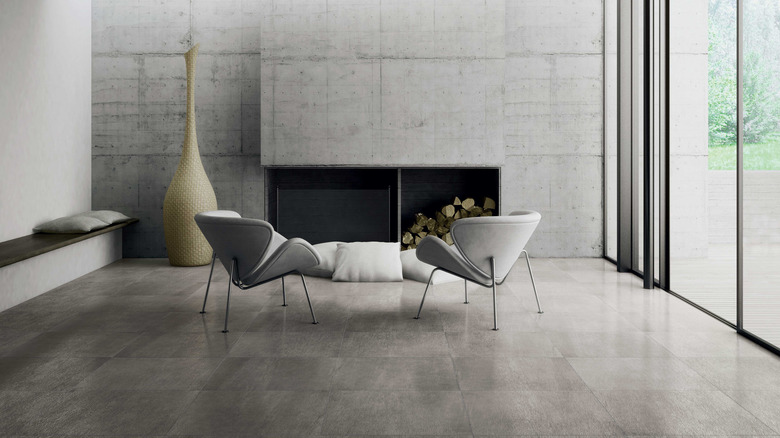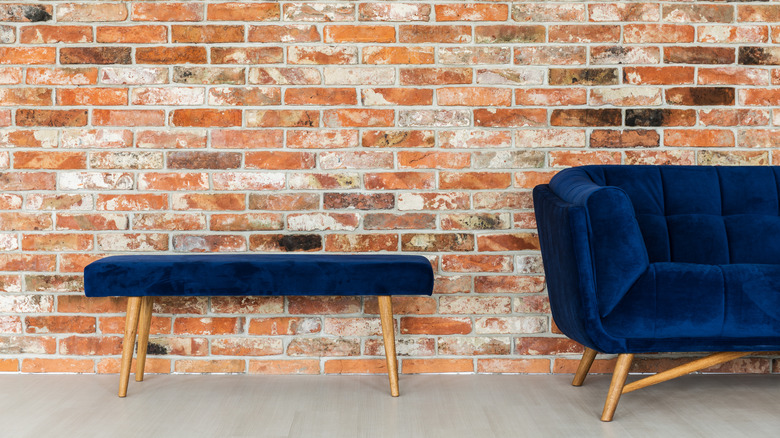Common Mistakes People Make When Picking Furniture For Their Home
Even for the most enthusiastic design lovers, picking furniture can be a bit of an intimidating task, as noted by The Spruce. Unlike a small accessory that you can artfully place in your space and tuck away if it's not working, large furniture pieces command a serious amount of attention, and make a major impact on the overall look and feel of your space. With so many styles out there, from French country to mid-century modern to industrial minimalist, it can be tough to decide exactly what type of pieces you want to include in your space.
At the end of the day, it is a matter of preference — if you absolutely love the way a piece looks in your space, don't let anyone convince you otherwise! However, there are a few quite common mistakes that many people make in their homes. Just being aware of these mistakes, and taking a little extra time to consider a few key elements when selecting furniture can make all the difference in how your space ends up looking.
Whether you're starting from scratch and completely revamping a room, or simply looking to freshen up your space with one new statement piece, here are five of the most common mistakes to avoid if you want to craft a room that's visually stunning as well as tailored to your specific needs.
Prioritizing form over function — and comfort
This may seem incredibly basic, but you'd be surprised at how often people make this mistake. Perhaps you saw something on your favorite design-focused television show, or a particular room caught your eye on Pinterest, and you have a very specific piece of furniture in mind that would enhance the space. But before you make the purchase, take a moment to consider the function and comfort of the piece as well as the form. Yes, you want your furniture to be visually appealing, but you also need it to do what you require in your home, explains Star of Mysore.
On a practical level, make sure the piece works — for example, if you're buying a new desk chair and it can't be adjusted much, double check that it's the right height for your desk, as Feige's Interiors suggests. If you're buying an item like a couch or armchair, take a moment to test it out in the store and confirm it's actually something you'd want to relax in after a long day. We all want furniture that looks great in our space and fulfills the overall design aesthetic we desire for our home, but if you can't actually use the furniture, it's a useless purchase, plain and simple.
Not measuring thoroughly beforehand
This is a mistake that seems so basic and simple, yet you'd be surprised at how often it happens. Before you even consider browsing for furniture pieces, make sure to measure the space you're looking to incorporate the furniture in thoroughly, as The Design Tourist recommends. Even if you find a gorgeous piece of furniture that you can absolutely envision in your space, if it's completely the wrong size, it just won't work. On a basic level, having all the measurements in your space will be helpful because it'll allow you to narrow down your selections and eliminate anything that's not the right size for your home.
If you want to take this tip to a whole new level, you can consider creating a floor plan of the room you're buying furniture for. After all, even if something can technically fit in a space, you may also want to be mindful of whether that new piece of furniture blocks foot traffic, is too close to a feature like a fireplace, may interfere with a closet door opening and closet, etc. Another quick tip while you have that measuring tape handy? You'll also want to be aware of any dimensions into the room, such as entryways — no one wants the experience of buying the perfect piece of furniture, only to find out it can't make it through your doorway into the house.
Picking pieces that are the wrong scale
This common mistake is very easy to make because you're often viewing furniture either online, or in a massive warehouse space or store, which can make it tough to visualize the scale of a particular piece, per Rent Mojo. For example, that dresser you have your eye on may look fantastic in the minimalist showroom filled with natural light, but when you put it in your own cramped, dark bedroom, it may be way too large for the space and just take over the room.
While measurements are important, you want to be sure you're considering the overall scale of things as well, so that all your design choices look purposeful. If you have an absolutely massive sectional sofa, for example, it may look a bit odd to have a teeny, tiny ottoman or side table. It may require a bit of extra work, but issues with scale are one of the reasons so many designers opt to use space planning tools (via HV Design Group). Though you may not have all the industry technology to create an exact replica of the room you're buying furniture for, even sketching out a rough floor plan may help you see where some potential issues might be, and what you should consider when selecting your new pieces.
Not considering your lifestyle
Perhaps you spotted an absolutely gorgeous white sofa with a delicate suede upholstery that's calling your name in a furniture store; however, if you have young children who will smear their food-covered hands all over it, or a black-furred dog who sheds like crazy, you'll likely find that piece looking worse for wear within no time at all. To that end, when it comes to buying furniture, one common mistake people make is not considering their lifestyle, as Bob Vila explains. It's easy to get swayed by beautiful design, but you also need to ensure the furniture you choose will work with your overall lifestyle.
For example, if you have children or pets, you may want to go for something that's a darker hue, or select a material that's easy to clean when buying items like couches or armchairs. If you've got a small space but absolutely love hosting dinner parties, a major requirement for your dining table purchase may be removable leaves that can expand your table when needed. This may even involve items like cabinet or shelf doors; if you have young children with grabby hands or wily cats that love to swat at decor accessories, you may want to select shelving units that have glass doors so there's a barrier to protect your beloved items. Before you make any purchase, take a few minutes to picture how the piece would fare in your home.
Being too matchy-matchy
There was a time when many furniture buyers would simply select a matching set, whether for their bedroom, dining room, or living room, and buy all the necessary pieces. After all, it takes the guesswork out of things — they're all designed to go together, so it'll look great in your space, right? Well, not exactly. While there's no rule against buying the matching set, furniture is an opportunity to show off some of your personality in your space, as noted by Bob Vila.
If you simply get a matching set of all the main pieces, the overall design of the room can feel a bit flat and one-note, as The DIY Playbook explains; you'll be lacking that variety in materials, textures, and colors. You certainly want your pieces to work together and complement each other — we're not suggesting you just toss a few random items in a room and hope for the best! However, avoid the impulse to just buy a matching set and instead take the time to find pieces you truly love, that work well together but also express your personality and overall design aesthetic. It may take a bit of extra effort, but the resulting space will be a lot more vibrant and eye-catching than a room where every piece of furniture looks roughly the same.





